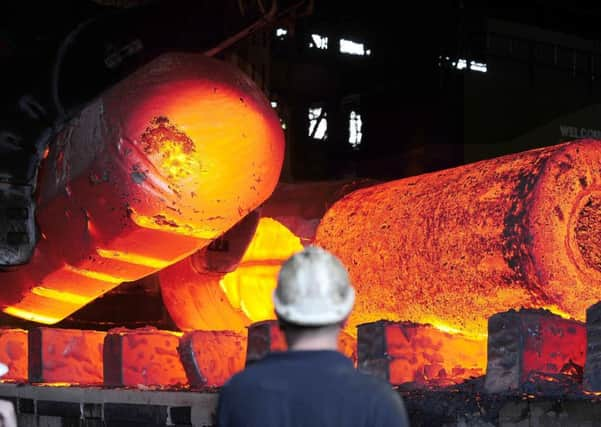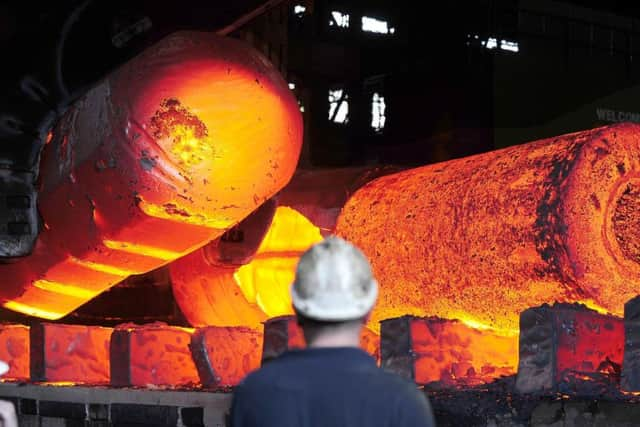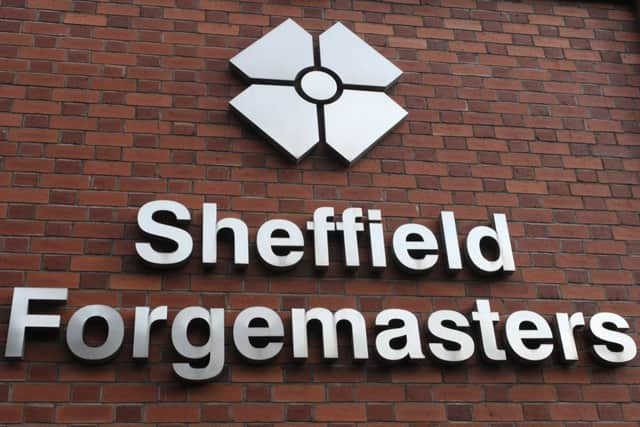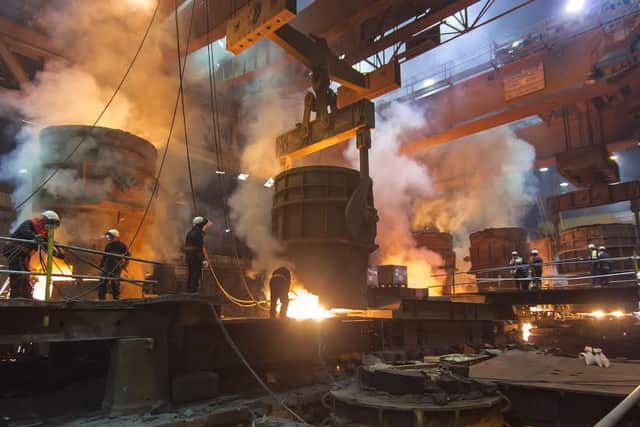ANALYSIS: Sheffield steels itself for the knockout punch as 100 jobs axed at Forgemasters


The news that another 100 steel jobs are to be axed in a city which has been melting and shaping metal on the banks of the River Don for over 700 years came as yet another hammer blow.
Following on from almost 700 redundancies in Rotherham and Stocksbridge last month, the loss of 100 jobs at Sheffield Forgemasters - one eighth of the company’s workforce - merely served to continue the dismantling of an industry that once helped build an empire.
Advertisement
Hide AdAdvertisement
Hide AdForgemasters may not manufacture steel, but the products they engineer from the metal that rolls out of local foundries is specialised and crafted using skills which are irreplaceable.


For Sheffield South East MP Clive Betts, today’s announcement underlines the need for urgent Government intervention to safeguard the continuity of Sheffield Forgemasters.
“We need to act now, not by bailing them out financially but by helping Forgemasters with their long-term order books,” said Mr Betts.
“The Government should bring forward major projects like the Swansea Bay Lagoon green energy scheme which requires lots of turbines made from components that Sheffield Forgemasters are the world’s best at making.
Advertisement
Hide AdAdvertisement
Hide Ad“The Government should also insist that companies like Sheffield Forgemasters have the ability to tender for all aspects of work when they award contracts to firms who build nuclear power stations.


“Our message when we do deals with the Chinese government should be ‘We can produce many of the component parts you need right here in UK regions like South Yorkshire and we expect you to source your parts locally.’”
Just a few weeks after the UK’s last deep coal mine, Kellingley Colliery was closed, Mr Betts refuses to countenance the possibility that Sheffield is now facing a future without steel.
“We will always need high quality steel and high quality engineering and Sheffield has a long and proud record of delivering both,” he said.
Advertisement
Hide AdAdvertisement
Hide AdSheffield’s rich history in the manufacture of knives and other cutlery dates back to medieval times and was noted by Chaucer in The Canterbury Tales of 1475.


The city’s five rivers and a rich local supply of raw materials such as iron ore, gritstone, peat and clay, were critical in establishing Sheffield as an industrial powerhouse.
Aided by an Act of Parliament in 1624, which saw the formation of the Company of Cutlers in Hallamshire in, Sheffield would go on to supply large parts of Britain’s expanding empire with iron and steel-based products.
Its importance gew during the industrial revolution with two key inventions: in the early 18th century Benjamin Huntsman, a lock and toolmaker in Handsworth, developed a system for manufacturing refined steel using clay crucibles which was to revolutionise the steel-making process and be used in variious for almost 200 years. And in 1856, when Henry Bessemer invented his Bessemer Converter, Sheffield became the world centre of large scale steel production from ever-bigger steelworks.
Advertisement
Hide AdAdvertisement
Hide AdSheffield’s reputation for industrial innovation continued in the 20th century with the discovery of stainless steel by Harry Brearley who, along with Dr William Hatfield at the Brown Firth research laboratories, perfected an alloy which remains the industry standard today.


John Brown and Thomas Firth owned two of Sheffield’s largest steelworks and in 1930 the companies merged to form the giant Firth Brown Steels which, along with companies like Vickers were some of the biggest employers in Sheffield and indeed the whole county.
In 1929 a quarter of the world’s steel was manufactured in Sheffield but by the time Harold Wilson’s Labour Government nationalised the industry to form the British Steel Corporation in 1967, that total had fallen to less than five per cent.
The Sheffield steel industry operated at near-full capacity in the post-War years: by the mid-1960s output had dropped by 20 per cent, largely as a result of increased competition from overseas and a reluctance by the city’s steelmakers to adopt more modern practices such as continuous casting.
Advertisement
Hide AdAdvertisement
Hide AdNationalisation came too late to save an industry which had already entered a spiral of terminal decline, although central ownership helped maintain employment levels throughout the 1970s, a decade in which competition from the Far East became an increasingly ominous threat.
The arrival of Margaret Thatcher as Prime Minister in 1979 led to an immediate acceleration of the rationalisation begun under 10 Downing Street’s previous tenant, Jim Callaghan, whose Government had fought a losing battle to arrest falling productivity within the British steel industry.
In 1980, the Industry Secretary Sir Keith Joseph appointed Ian MacGregor, a Scottish-American metallurgist, as chairman of BSC. On the day he started work the industry had a workforce of 166,000 but within three years that figure had fallen to 71,000, enabling MacGregor to reduce BSC’s annual losses from £1.8 billion to £256 million.


The job cuts were not unique to British Steel: during the 1980s employment levels in the steel industries of countries like France, Germany and the United States also fell by between 50 and 80 per cent.
Advertisement
Hide AdAdvertisement
Hide AdBritish Steel was privatised in 1988, by which time the company had recorded a profit of of £177 million from a turnover of £3.5 billion. In 1999, British Steel was merged with a Dutch steel producer to create the Corus Group, which in 2007 was purchased by the Indian manufacturer Tata, who paid £6.7 billion for a company that employed over 20,000 people in the UK.
The takeover made Tata the world’s fifth largest steelmaker but the Indian behemoth has found itself vulnerable to falling demand and the burgeoning Chinese steel industry, which continues to undercut producers around the world.
Higher energy costs have also added to the pressure on Tata, which has made more than 5,000 British steelworkers redundant in the last five years.
Tata’s plants at Scunthorpe, Teesside and Scotland have been most badly hit but last month the company confirmed the loss of 685 jobs at Rotherham and Stocksbridge.
Advertisement
Hide AdAdvertisement
Hide AdIn spite of the constant erosion of employment across South Yorkshire’s steel industry, each announcement of more job losses is a telling blow to the region and the news of 100 more redundancies at Sheffield Forgemasters is particularly painful.
Formed in 1983 as a division of the nationalised British Steel, Sheffield Forgemasters has negotiated a difficult journey over the last three decades, mainly because of the specialist nature of the forgings and castings it produces for the nuclear and wind turbine industries.
In a statement, Sheffield Forgemasters chairman Tony Pedder said: “The storm clouds which seem to gather periodically over the steel and steel-related sectors are once again evident.
“Of particular concern has been reduced activity in the traditional oil and gas sector, with oil prices down to a level that is deferring much potential new investment.”
Advertisement
Hide AdAdvertisement
Hide AdOnly last November in a debate in the House of Lords, the Bishop of Sheffield, the Right Reverend Steven Croft called on the Government to produce a level playing field for energy costs to help the UK steel industry.The irony that falling oil prices have contributed to the downturn in Sheffield Forgemasters’ business will not be lost on the hundreds of steelworkers who have lost jobs in the last few years because of increased energy costs.
The steel industry in South Yorkshire endures for now but its guard continues to drop: only direct action from Westminster can delay the day when it is time to throw in the towel.